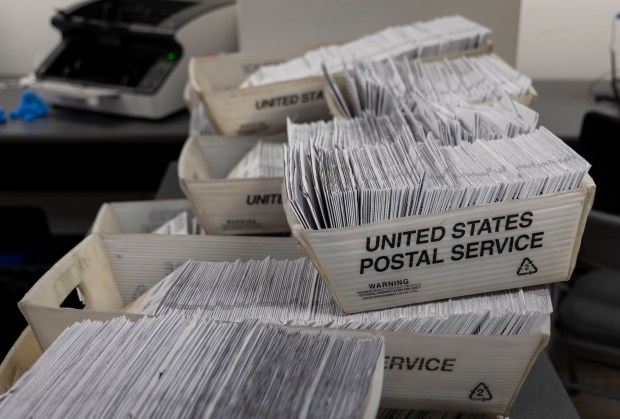With five days to go until vote counting ceases in the Democratic primary race for state’s attorney, the trickle of ballot returns showed retired Appellate Judge Eileen O’Neill Burke sustaining her lead over university lecturer and former prosecutor Clayton Harris III.
Chicago and Cook County election officials tallied just 276 Democratic ballots in the race Thursday as the window for Harris to overtake O’Neill Burke appears to be closing. She leads by 1,623 votes, a margin that’s barely budged all week.
Though ballot returns since Election Day have favored Harris, there have not been enough votes for him thus far. Harris has not conceded, O’Neill Burke has not declared victory, and The Associated Press has not called the race.
On Wednesday, Harris’ campaign said it would wait until next Tuesday — the last day for mail ballots to be counted — to decide its next steps. If Harris continues to lag behind O’Neill Burke, his options would be to concede defeat or ask for a recount to double-check the accuracy of the final results, which is a costly and time-consuming option with uncertain results.
O’Neill Burke’s camp has remained confident she would prevail despite the fact the count has been lengthy. And both campaigns have expressed confidence the vote tabulation process was being conducted fairly, despite frustrations over some miscalculations throughout the process.
On Thursday, the Cook County clerk’s office tallied just eight suburban ballots in the contest. Though the Chicago Board of Elections planned to tabulate a portion of 1,991 outstanding provisional ballots on Thursday, those will be tabulated Friday, spokesman Max Bever said.
In all, more than 51,000 Democratic votes in the contest have been added to the unofficial count since election night, less than 10% of all the votes cast in the race. That has included outstanding precincts, and mail-in and nursing home votes from both the city and suburbs. Tens of thousands of mail ballots have still not been returned and are not expected to be.
The decision by Democratic voters on who should succeed outgoing top prosecutor Kim Foxx came to represent a conflict within the party more broadly — how to reform government systems they believe are fundamentally flawed while responding to fears over a pandemic-fueled rise in crime that has not fully subsided.
Foxx helped lead a national reform movement in which prosecutors tackled alleged police misconduct, wrongful convictions and restorative justice.
Both candidates said they would continue many of Foxx’s policies, though O’Neill Burke became a more vocal critic in the campaign’s waning days. Harris — who was endorsed by the county’s Democratic Party and by Foxx herself just before Election Day — ran on a “safety and justice” campaign that touched on both the need to charge forward on a reform agenda while also stressing the office’s responsibility to ensure “people know that we take crime seriously, that we’re not living in a lawless society.”
The eventual winner will have the upper hand in the November general election. County voters have not elected a Republican to lead the office since 1992. The Democratic nominee will face attorney and former Chicago Ald. Bob Fioretti, a former Democrat who this year is running as a Republican, and Libertarian Andrew Charles Kopinski.



